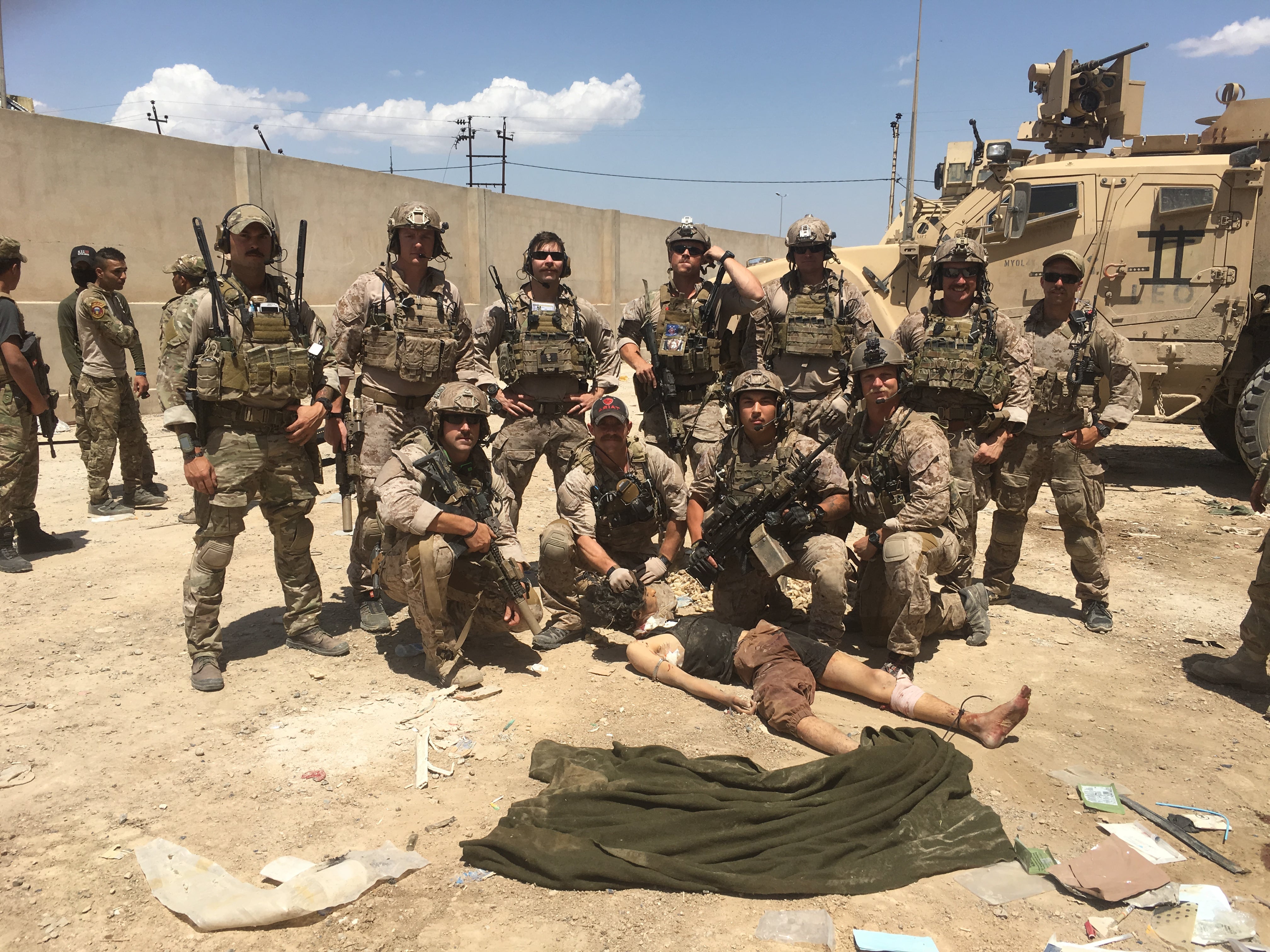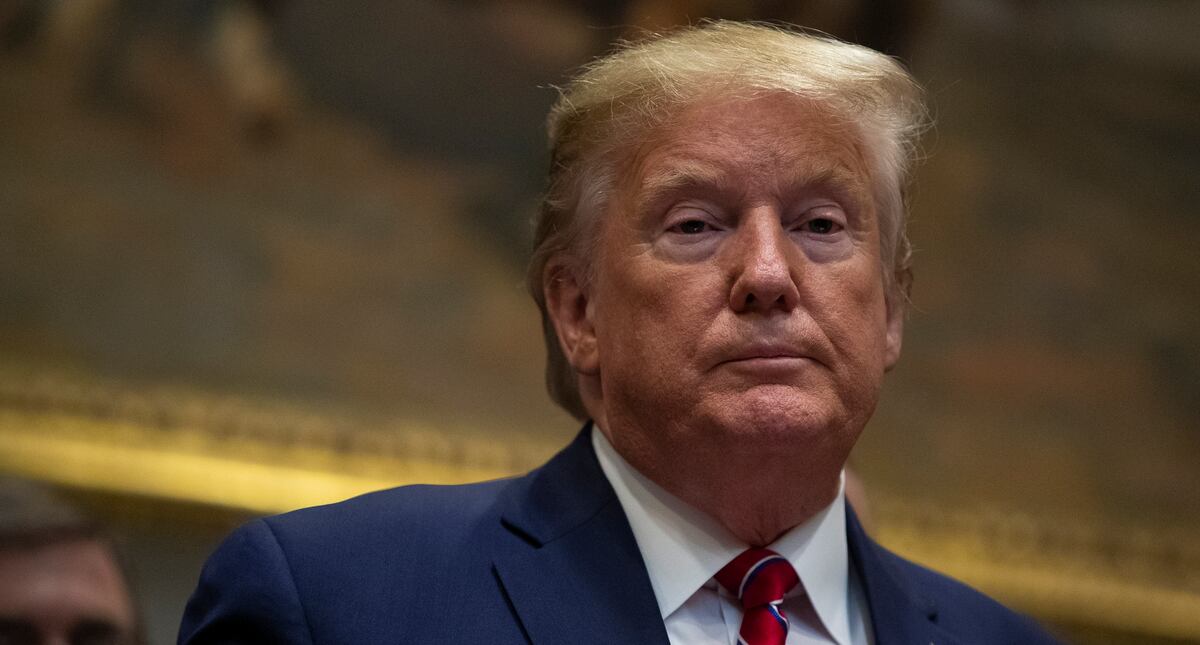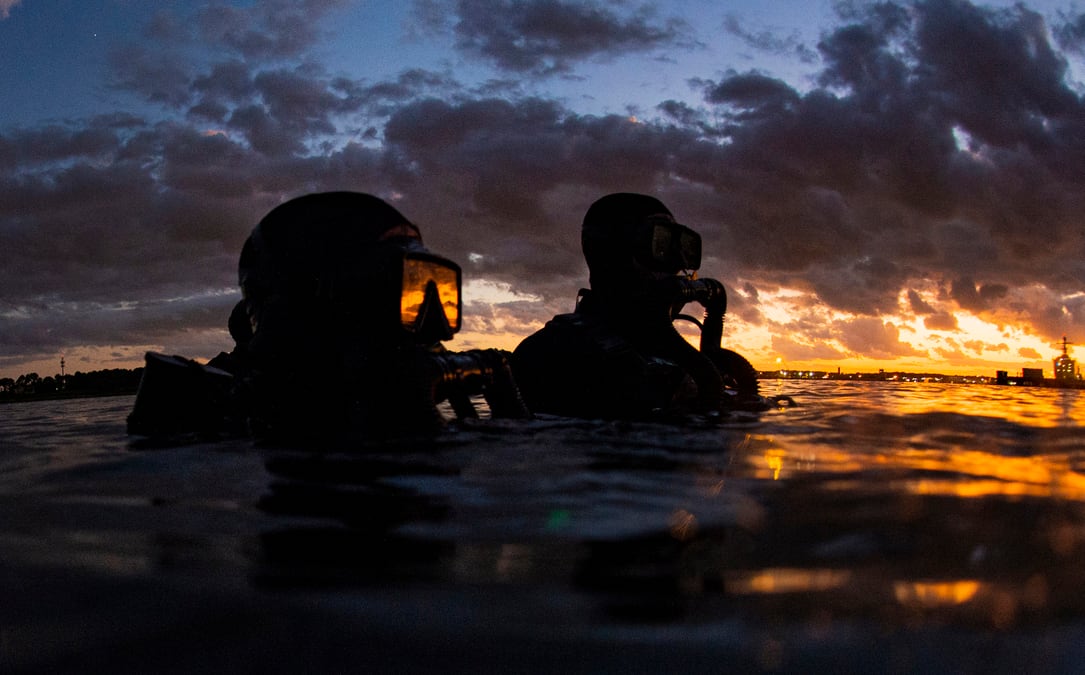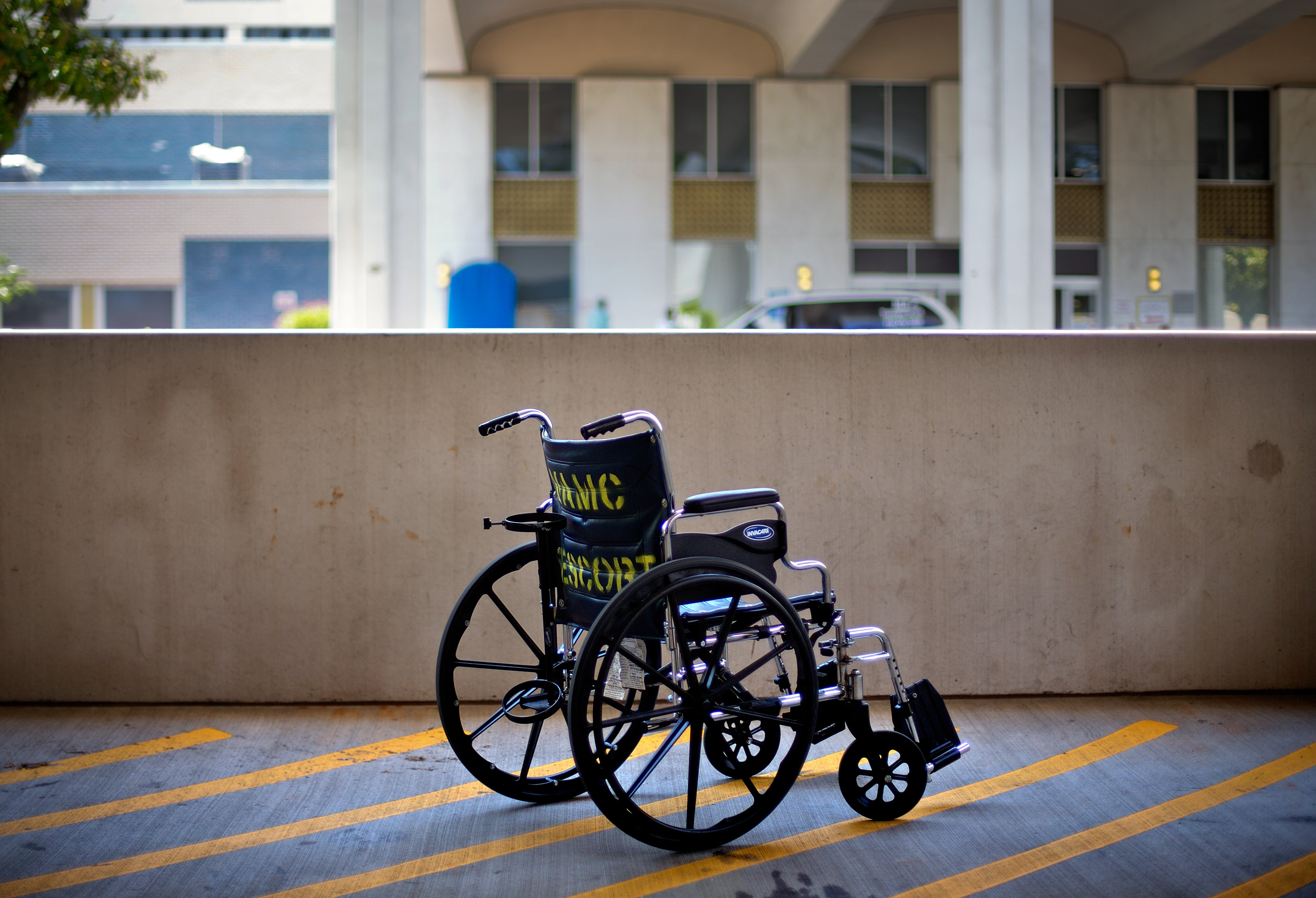Amid a crisis in traditional civilian-military relations, an unconventional commander in chief took to Twitter on Thursday to telegraph his displeasure with Navy leaders who tried to take a SEAL’s trident.
“The Navy will NOT be taking away Warfighter and Navy Seal Eddie Gallagher’s Trident Pin,” President Donald J. Trump tweeted.
“This case was handled very badly from the beginning. Get back to business!”
It remains unclear if Navy leaders consider Trump’s tweet to be an actual order.
And even if it’s an order, they seem to have cast doubt on whether it’s lawful, arguing internally that the fate of Gallagher’s trident is an agency regulatory matter, much like determining whether a pilot can qualify for a license.
Just as the president can’t order the Federal Aviation Administration to certify his son as a pilot, the commander in chief can’t order them to keep Gallagher a SEAL, they’re suggesting behind closed doors.
Whether the American people or Trump buy that reasoning remains to be seen, but the Navy’s top leaders already had aligned themselves behind the push to strip Gallagher of his trident and evict him from the SEALs.
Then on Thursday evening, the admirals seemed to suggest a way to back down off of a scary precipice.
“The Navy follows the lawful orders of the President," said the Chief of Naval Information Rear Adm. Charles Brown in an email to Navy Times.
"We will do so in case of an order to stop the administrative review of SOC Gallagher’s professional qualification. We are aware of the President’s tweet and we are awaiting further guidance.”
The spat had been building for months as the president repeatedly intervened in the Navy’s prosecution of Gallagher, a case that became a rallying cry for Trump’s supporters.
On Nov. 15, Trump took his most aggressive action to date when the White House announced that the commander in chief had advanced Gallagher to special warfare operator chief, overturning his demotion to petty officer first class.
Moments after the White House’s announcement, however, Rear Adm. Charles Brown, the Chief of Naval Information, fired out his own tweet.
It also sparked controversy.
“As the Commander in Chief, the President has the authority to restore Special Warfare Operator First Class Gallagher to the pay grade of E-7. We acknowledge his order and are implementing it,” Brown wrote.
That was perceived by Gallagher’s supporters as a subtle slur that sullenly belittled the president’s order and derided Gallagher as a mere “E-7,” a term used throughout the fleet to lampoon chiefs who don’t meet the standards of the Goat Locker.
At the same time, anti-Trump tweeters embraced Brown’s message as a wink-wink sign of resisting a president and military policies they don’t like.
Brown later disputed that, telling Navy Times in an email that it “was not a political statement, and the language it used was consistent with the White House statement.”
But the controversy already had caught hold.

Gallagher had been accused of committing a string of war crimes in Iraq in 2017 while the top enlisted sailor in Alpha Platoon, SEAL Team 7. The 40-year-old SEAL was acquitted by a military jury of murder, obstruction of justice and all the other major charges during a July court-martial trial.
Yet the panel of his peers found him guilty on the sole charge of posing alongside a dead Islamic State prisoner of war’s body, a charge he never denied.
At least a dozen other SEALs, including a commissioned officer, also appeared in images next to the body, but they were never charged with the crime.
Had the photograph incident not been part of a court-martial, the offense likely would’ve been handled administratively, most likely with a written reprimand, and the highly decorated Gallagher would’ve retired as a senior chief after more than two decades of service.
A military jury recommended Gallagher be reduced in grade to petty officer first class, and that verdict was upheld by Chief of Naval Operations Adm. Mike Gilday on Oct. 29.
Yet 17 days later, Trump upended the traditional military justice process by issuing an executive order that returned Gallagher’s anchors.
That seemed to finally settle the scandalous SEAL saga that had dragged out for more than a year.
On the other side of the country, however, the Navy’s top SEAL, Naval Special Warfare commander Rear Adm. Collin Green, was plotting his long anticipated move to yank Gallagher’s trident and evict him from the teams.
To Green, it seemed as if it could be done in an administrative process separate from Gallagher’s trial and did not explicitly conflict with Trump’s initial order restoring his rank to chief.
And the two-star appeared to have mustered the support of his uniformed chain of command to administratively punish Gallagher, even if it was perceived as defying the White House.
“Chief of Naval Operations, Adm. Mike Gilday, supports his commanders in executing their roles, to include Rear Adm. Green,” Gilday’s spokesman, Cmdr. Nate Christensen, told Navy Times on Nov. 19.
The Navy’s top civilian also appeared to back Green’s effort to remove the trident.
Cmdr. Sarah Higgins, spokesperson for Navy Secretary Richard V. Spencer, echoed that he also “supports his commanders in executing their roles, to include Rear Adm. Green.”
RELATED

To move forward with the administrative process to determine the fate of Gallagher’s trident, Green has notified Gallagher of a hearing slated to start on Dec. 2 at WARCOM’s headquarters in Coronado, California.
The panel will “evaluate your operational ability, ethics, judgment, potential and motivation for continued service” as a SEAL, according to a document obtained by Navy TImes.
Green also sent a similar notification to the former officer in charge of Alpha Platoon, Lt. Jacob X. “Jake” Portier.
On Aug. 1, then-CNO Adm. John Richardson dismissed his case. Before his intervention, the Navy was trying to prosecute Portier for covering up a crime a military jury said never happened.
A Thursday email sent to Navy leaders by Portier’s defense attorney, Jeremiah J. Sullivan III, asked them to confirm if Green was continuing to try to take tridents from the SEALs.
“I have learned that Admiral Green is challenging the authority of POTUS and is forcing his subordinates to pick a side,” Sullivan wrote. "I am placing you on notice that this is a violation of the Uniform Code of Military Justice and that the Judge Advocate General’s Corps (JAGC) and the Naval Criminal Investigate Service have an obligation to intervene.
“Additionally, please confirm the role of the JAGC in supporting Admiral Green’s acts of insubordination. I have copied Admiral Hannick and Admiral Crandall on this e-mail since this matter involves POTUS. Finally, It is my understanding that the Secretary of the Navy (SECNAV) will be visiting WARCOM tomorrow. I respectfully request a meeting with SECNAV if his calendar permits.”
Gallagher’s legal team told Navy Times that they’re treating Green’s silence as a sign he’s defying Trump’s order and are preparing their client for the upcoming Trident Review Board.
Internal records leaked earlier this week to Navy Times revealed that Green will allow Gallagher to appear before the board at 8 a.m. on Dec. 4 but the panel’s recommendation would be forwarded to Green two days later.
Gallagher isn’t allowed to be represented by legal counsel or copy the evidence that was compiled to be used against him.
He also must submit a list of witnesses to Green by Nov. 27, but the rear admiral will determine if they were relevant or reasonably available before greenlighting an appearance before the closed hearing, according to the records.
Led by defense attorneys Timothy Parlatore and Marc Mukasey, Gallagher’s legal team has begun compiling photos of SEALs who also posed next to dead bodies in Iraq and Afghanistan, including active duty commissioned officer scofflaws who serve under Green.
Sullivan and Parlatore told Navy Times that the first witness their clients will call is President Donald J. Trump.
“You can’t suppress truth,” said Mukasey, who also has represented Trump. “You can’t suppress family. You can’t suppress honor. You can’t suppress loyalty. You can’t suppress Eddie.”
Appeals by Gallagher supporters to Trump have worked before.
On March 30, a tweeting Trump ordered the Pentagon to release the SEAL from pretrial confinement in San Diego’s Naval Consolidated Brig Miramar.
After Gallagher’s court-martial case collapsed, Trump tweeted congratulations to the SEAL, his wife Andrea, and his entire family.
On July 31, the president nixed Navy and Marine Corps Achievement Medals doled out to prosecutors in a case dogged by allegations of military corruption reaching into the upper levels of the Navy Yard and Coronado, California-based Naval Special Warfare.
Before Gallagher’s court-martial trial even kicked off, Navy judge Capt. Aaron Rugh sanctioned the prosecution for repeatedly violating Gallagher’s constitutional rights.
Part of Rugh’s punishment included booting Cmdr. Christopher Czaplak, the lead prosecutor, for his role in a warrantless surveillance program cooked up with Naval Criminal Investigative Service agents to track emails sent by defense attorneys and Navy Times.
They were accused of manipulating witness statements to NCIS agents; using immunity grants and a bogus “target letter” in a crude attempt to keep potential pro-Gallagher witnesses from testifying; illegally leaking documents to the media to taint the military jury pool; and then trying to cover it all up when they got caught.
Fallout from the Gallagher prosecution wasn’t the only bad headline battering Green’s command over the past year.
In Virginia, a member of SEAL Team 6 was accused of going online to catfish three women, prompting them to sending racy photos of themselves. And his superiors drew accusations that they committed unlawful command influence to make sure he wasn’t given a fair trial.
Navy Times also received an internal probe at SEAL Team 10 that diagrammed how special warfare operators defeated drug testing they called “a joke” while snorting cocaine or spiking their booze with the narcotic.
Then a boozy July 4 party in Iraq, where liquor is banned for the troops, triggered the eviction of Foxtrot Platoon, SEAL Team 7, from the theater, sexual assault and fraternization allegations trailing in their wake.
On Aug. 20, an exasperated Green issued a “back to basics” directive that warned leaders he’d hold them “accountable for all substandard issues related to your personnel on and off duty.”
Saying “a portion of this Force is ethically misaligned” with traditional SEAL culture because of those “who fail to correct this behavior” and instead “prioritize this misalignment over the loyalty to Navy and Nation,” Green’s four-page memo also ordered his special operators to get regulation haircuts, undergo uniform inspections and ditch unapproved patches and other insignia.
“This drift ends now,” Green wrote in his order.
RELATED

He seemed to give force to his words on Sept. 6, when he fired the leadership triad of SEAL Team 7.
Shortly after their relief, however, Cmdr. Edward J. Mason and Master Chief Special Warfare Operator Hugh C. Spangler filed a complaint with the Pentagon’s Inspector General, urging investigators to probe the real reasons behind their removals.
Their complaint depicted Green as a scheming martinet willing to trash the reputations of bonafide SEAL combat heroes to preserve his precarious perch atop Naval Special Warfare, according to documents obtained by Navy Times.
They also portrayed the two-star as obsessed with Gallagher.
Although Gallagher was long gone from SEAL Team 7 when Mason took the helm in late 2017, the IG complaint revealed a meeting where Green allegedly accused the commander of failing to adequately address a lingering “Gallagher Effect,” a phenomenon which was never defined in the filing.
But the apparent failure of Mason and Spangler to properly address the so-called Gallagher Effect partly led to their firings, actions by Green that “publicly undermines the President in front of the (Naval Special Warfare) community,” their IG complaint alleged.
Through his attorney Parlatore, Gallagher filed his own IG complaint against Green on Nov. 19.
It attacked CHINFO Brown’s tweet as “a passive aggressive statement of disagreement, but grudging acceptance.
“If any subordinate officer passed on orders from their superior in this fashion, he would be immediately fired – ‘As the commander of this ship, the CO has the authority to order us to do maintenance on our equipment. We acknowledge his order and are implementing it,’” the complaint stated.
Echoing the ongoing IG probe launched by SEALs Mason and Spangler, Gallagher’s complaint also alleged Green appeared “unable to respect the constitutional principles that they have sworn to uphold in their vendetta against SOC Gallagher.
“It seems like the obvious question here is, ‘Why?’ Why is (Naval Special Warfare) obsessed with punishing SOC Gallagher even though he has already suffered unjust punishment? Why is NSW seeking retribution against SOC Gallagher when it should be looking inward at its own organization? The answer is simple: It is easier to cast out SOC Gallagher and blame POTUS for his intervention than it is to correct an internal leadership problem,” the complaint stated.

Nestled in the long paragraphs of the complaint, however, was what Gallagher’s legal team termed a “sinister” staff meeting convened by Green in Coronado shortly after the president issued his executive order restoring the SEAL’s anchors.
They urged investigators to probe whether during that session Green “made clear his contempt of the President and disagreement with the President’s decision, before declaring that he intended to remove SOC Gallagher’s trident anyway.”
In an email to Navy Times, Naval Special Warfare spokesperson Capt. Tamara Lawrence called allegations that Green uttered contemptuous words about the president “patently false.”
But she declined to comment about other issues raised by the IG complaint, including what it called “the Commander in Chief’s clear guidance that he felt the punishment was too severe for such a minor offense” and why Green thought it “appropriate to countermand this and increase the punishment.”
Based on the documents provided to Navy Times, it remains unclear what, if any, comments were made by Green about the president.
But the allegation has heightened the growing tension between Green and the White House.
Gallagher’s legal team warned that the Navy secretary and CNO joining forces with a renegade SEAL two-star threatened to rupture the delicate balance between elected leaders like Trump and the armed forces.
“The president has spoken on the punishment of Eddie Gallagher,” said Parlatore, a former surface warfare officer. “A two-star admiral should not be stepping in to substitute the judgment of his commander in chief. This is a terrible precedent to send and the commander in chief should take swift and decisive action against Rear Adm. Green.
“As for those in his chain of command who appear to be supporting Green, there needs to be a wholesale change in leadership. If Navy leadership can’t accept the commander in chief’s guidance, then they all should leave.
“There’s a long tradition in the military. You don’t rebel. You resign.”
Prine came to Navy Times after stints at the San Diego Union-Tribune and Pittsburgh Tribune-Review. He served in the Marine Corps and the Pennsylvania Army National Guard. His awards include the Joseph Galloway Award for Distinguished Reporting on the military, a first prize from Investigative Reporters & Editors and the Combat Infantryman Badge.





